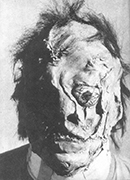|
Are you a bad enough dude to read a book? This poll is closed. |
|||
|---|---|---|---|
| Warlock by Oakley Hall |
|
5 | 16.67% |
| Popular Hits of the Showa Era by Murakami |
|
3 | 10.00% |
| Zen and the Art of Motorcyle Maintenance by Pirsig |
|
3 | 10.00% |
| Zorba the Greek by Nikos Kazantzakis |
|
4 | 13.33% |
| I, Claudius by Robert Graves |
|
15 | 50.00% |
| Total: | 21 votes | ||
|
You can vote for one, or more than one, or even all of them! But if you vote, and the book you vote for is chosen, please participate in the discussion. Thanks! Warlock by Oakley Hall quote:Warlock is a western novel by American author Oakley Hall, first published in 1958. The story is set in the early 1880s, in a fictional southwestern mining town called Warlock and its vicinity. The novel's characters and many elements of its plot are loosely based on actual people and events from Tombstone, Arizona during the same time period, including Wyatt Earp and the Gunfight at the O.K. Corral.[1] Franchescanado posted:Warlock is an classic western that inspired a lot of American Post-Modern writers, (including Farina, Pynchon, DeLillo, McCarthy etc.) that takes many genre conventions of westerns and fulfills them while also turning them on their head. It's basically "The greatest western that no one has read". 2) Popular Hits of the Showa Era quote:Murakami, the aging enfant terrible of Japanese letters, built his reputation on gleefully shocking novels, peopled by sexual deviants and murderous psychopaths. His latest work to be published in English concerns a quintet of torpid young men who share a taste for karaoke, rock-paper-scissors, and “droolingly mindless” laughter. On a whim, one of them cuts the throat of a woman he bumps into on the street; her friends—a sextet of stodgy divorcées in their late thirties—decide to take revenge. As the violence escalates (a rocket launcher and an atomic bomb come into play), both groups experience, for the first time, friendship and a sense of purpose. The satire is broad, but Murakami is mercilessly funny as he tracks his characters’ evolution from twits to scholars of guerrilla warfare. ♦ http://www.newyorker.com/magazine/2011/02/07/popular-hits-of-the-showa-era quote:It's a set-up like a video game: two rival gangs fight to death for the control of a Tokyo district. In one gang, six young losers committed only to drinking, voyeurism and karaoke singing, in the other six tough independent older women. From ambush to revenge, both groups are gradually decimated until the ultimate showdown. http://www.pushkinpress.com/book/popular-hits-of-the-showa-era/ 3) Zen and the Art of Motorcycle Maintenance, Robert Pirsig quote:[ https://en.wikipedia.org/wiki/Zen_and_the_Art_of_Motorcycle_Maintenance 4) Zorba the Greek by Nikos Kazantzakis, quote:I'd heard of Zorba the Greek, in the way that the classics of modern literature totter into the subconscious even without being read or studied. It was only while holidaying in Greece in summer 2010 that I bought a tatty, overpriced Faber edition from a small bookshop in Athens as I waited for the boat to Heraklion, the main port of Crete where Nikos Kazantzakis, the book's author, was born and is buried. 5) I, Claudius by Robert Graves quote:I, Claudius (1934) is a novel by English writer Robert Graves, written in the form of an autobiography of the Roman Emperor Claudius. Accordingly, it includes the history of the Julio-Claudian Dynasty and the Roman Empire, from Julius Caesar's assassination in 44 BC to Caligula's assassination in 41 AD. Three days to vote from . . . mark! Hieronymous Alloy fucked around with this message at 16:05 on Apr 30, 2017 |
|
|
|
|

|
| # ? May 5, 2024 04:35 |
|
please vote for i claudius
|
|
|
|
|
I'm a long-standing dilettante in Roman matters (to the point of once studying a whole year's worth of Latin for fun), and what do you know, I haven't actually read Graves yet.
|
|
|
|
Graves gets the poliice verso. I'll get the thread up in a bit, probably this weekend.
|
|
|
|
|
I have been a Bad Mod but I'll get the thread up tonight
|
|
|
|






